Goteborg (Gothenburg, Sweden)
Cruise Port schedule, live map, terminals, news
Region
Baltic - Norwegian Fjords - Russia
Local Time
2024-09-19 03:33
 54°F
54°F 12.1°C

 Light breeze
Light breeze1.8 m/s
 71 °F / 22 °C
71 °F / 22 °C 52 °F / 11 °C
Port Goteborg cruise ship schedule shows timetable calendars of all arrival and departure dates by month. The port's schedule lists all ships (in links) with cruises going to or leaving from Goteborg, Gothenburg, Sweden. To see the full itineraries (ports of call dates and arrival / departure times) and their lowest rates – just follow the corresponding ship-link.
| Day | Ship | Arrival | Departure |
|---|---|---|---|
| 14 October, 2024 Monday | 07:00 | 14:00 | |
| 28 October, 2024 Monday | 09:00 | 18:00 |
Goteborg (aka Gothenburg) is a major port city in Sweden (country's 2nd-largest, after the capital Stockholm) located at the mouth of Gota Alv River (Sweden's west coast). By population (around 550,000, metro ~1 million) the metropolis is ranked Scandinavia's 5th-largest - following Stockholm Sweden, Copenhagen Denmark, Oslo Norway and Helsinki Finland.
The town was established in 1621 and houses the Chalmers University of Technology and the University of Gothenburg. Volvo Cars (Volvo Personvagnar AB / car manufacturing company) was founded here in 1927. The city is served by Goteborg Landvetter Airport, located approx 30 km (19 mi) southeast of downtown. Gothenburg hosts some of the biggest annual events in Scandinavia. Among those are Gothenburg Film Festival (held in January, a leading Scandinavian movie event with over 155,000 visitors per year) and a variety of music festivals (held in the summer), such as Metaltown and Way Out West.
Port Gothenburg
Port's cruising season runs from early-April through early-October. Statistics show that on average, while the ship is docked, each cruise tourist spends EUR 72 (USD 81) on food, tours / excursions and shopping. In 2017, port's cruising business generated a revenue of nearly EUR 4,3 million (USD 4,8 million).
The seaport is ice-free the whole year-round. Another feature is the comparatively short approach time from open sea to its quays - around 90 min. The quick approach to the city makes Goteborg a most attractive call port for cruise ships. The seaport employs around 22,000 people.
Gothenburg cruise port's statistics show the following numbers of "ship visits / handled cruise passengers" per year.
- 2002 (5 / 2400), 2003 (13 / 5500)2004 (18 / 14200)
- 2005 (20 / 12700), 2006 (18 / 11300), 2007 (23 / 11400)
- 2008 (18 / 12400), 2009 (34 / 36000), 2010 (41 / 51700)
- 2011 (52 / 64000), 2012 (62 / 70000), 2013 (39 / 40000)
- 2014 (73 / 108000), 2015 (52 / 100000), 2016 (34 / 56000)
- 2017 (44 / 60000) - the largest among the visiting ships were Norwegian Getaway,Mein Schiff 6 (launched in May) and AIDAcara.
- 2018 (44 / 60000)
- 2019 (62 / 100,000) - scheduled call by Disney Cruises (MS Disney Magic) and regular calls by Costa Favolosa (leaving roundtrip from Warnemunde-Rostock on 7-day Norwegian Fjords itineraries).
Among the largest cruise companies which vessels visit Gothenburg are Viking Ocean, NCL, AIDA, MSC, Costa, TUI, Marella, also the luxury brands Seabourn, Silversea, Phoenix Reisen.
Due to its strategic location, Goteborg easily became Scandinavia's biggest cargo shipping port. Around 70% of Scandinavia's maritime shipping traffic is concentrated within a 500 km / 310 mi radius around Goteborg. Port's terminals can handle largest container ships, ro-ro vessels (roll-on/roll-off), oil tankers, bulk cargo ships, car and passenger ferries, cruise ships. The port also has large energy terminals.
Port Gothenburg (locode SEGOT) has many railways. Daily, around 70 freight trains run to and from it, with 25 of those being container-cargo shuttles linking the port with all major cities in Sweden and Norway. In the city also meet all Northern Europe's major highways - E6 (Oslo, Copenhagen), E20 (Stockholm), E45 (Karlstad).
Most of the Port's Ro-Ro traffic (wheeled cargo) with mainland Europe is via Belgium (Ghent and Zeebrugge, functioning as hubs for intra-European ro-ro shipping. In FY2017, between Gothenburg and Belgium ports were shipped around 254,000 ro-ro units, increasing in 2018 10% (to nearly 280,000). FY2018 was the port's 9th consecutive year with increased ro-ro traffic with Belgium. The largest companies providing Ro-Ro (and Ro-Pax / passenger) shipping services to and from Belgium are CLdN (fka Cobelfret), DFDS Seaways, EML (Euro Marine Logistics), and SOL (Swedish Orient Line).
Port Goteborg is also linked with Spain (Santander by CLdN, Bilbao by SOL), and also with Greece and Turkey via Ghent-Trieste Italy (after UN-RoRo was acquired by "DFDS Logistics Gothenburg" in 2018). As of 2020, Gothenburg offers ~70 weekly Ro-Ro departures. It was estimated that ~100,000 Ro-Ro units are transshipped annually between ship-train-truck at the new Arken Combi Terminal.
On February 7, 2018, officially opened Arken Combi Terminal (new Ro-Ro terminal) resulting in higher freight capacity, improved efficiency, better logistics. Air pollution was significantly reduced as over 100 trucks now skip passing through downtown daily.
- The project was co-funded by the port and the Swedish Transport Administration.
- The new combo terminal covers 65,000 m2 (700,000 ft2) and is adjacent to the Ro-Ro and container terminals in port's outer area. Containers and trucks can now switch between road, rail and sea for transportation throughout Sweden.
- The terminal handles more cargo than the old Gullbergsvass terminal (now closed). It handles 7 trains per day and has annual capacity over 100,000 trailers. The old Gullbergsvass terminal site was used for the construction of West Link (8-km double-track rail through downtown).
In recent years, the port was largely developed and expanded by building new logistics park, new terminals (Arken marshaling yard's intermodal terminal, Arendal Ro-Ro terminal), import warehouses (Torsviken), roads and railways, making it Scandinavia's freight hub. Nearly 30% of Sweden's foreign trade is handled here. For the construction of all the port's new areas is used excavated clay from city infrastructure development projects.
In 2017, Goteborg was ranked Scandinavia's largest car-handling port, with car carrier operations steadily growing since 2012. 2017-Q1's statistics showed 67,682 new cars carried through the port (12% increase over 2016-Q1). Data showed 30% increase in import cars - mainly Renault and Nissan, followed by Chevrolet, Ford, Opel. All vehicles are handled at the RoRo Terminal and Logent Ports-operated terminals. Car export is mainly Volvo. During 2017-Q1, the seaport reported 3% increase in new cars export, thanks to the sales growth of Goteborg-produced (at Torslanda Plant) Volvo models. Port's FY2016 statistical data showed the following impressive numbers:
- Handled containers 798,000 (TEUs)
- Ro-Ro ships 538,000
- Cars 246,000
- Passengers (ferry and cruise ship) 1,733 million
- Oil 23,7 million tons
- Freight 40,9 million tons
2017 was the last year when cruise ships docked in Frihamnen. The area is part of an urban development plan for building residential and business properties (homes and offices), forcing the relocation of the Frihamnen cruise terminal. The new (America Cruise Terminal) is at Stigbergskajen (in Masthugget). The quay and part of Amerikaskjulet (terminal building) were restored to handle cruise ship tourists since 2018.
In early-September 2017, the Swedish company Swedegas AB (owned by "Fluxys and Enagas") contracted the engine manufacturer "MAN Diesel and Turbo" to supply Port Gothenburg with MAN Cryo (marine LNG fuel system) for the port's new LNG bunkering facility.
- The project was started in late-January and completed in November 2018. The new facility allows vessels to be fueled with LNG (liquefied natural gas) and LBG (liquefied biogas) delivered from trucks or containers during loading / unloading cargo operations. It is purpose-built and serves ships docking at Energy Port's two jetties.
- LNG and LBG are supplied by Barents NaturGass - 2005-founded Norwegian company specializing in gas distribution. Port's bunkering facility comprises of a discharge station (LNG trailers, containers), feeding pumps, vacuum-piping and bunkering equipment. The bunkering station is operated and managed by Swedegas - owner of Sweden's gas network (extending from Dragor Denmark to Stenungsund / Gotaland Sweden). Swedegas network supplies 33 Swedish municipalities, also industrial companies, heat and power plants, vehicle filling gas stations. Swedegas also developed a new infrastructure for transmission of LBG, LNG and hydrogen gas.
- Currently, Skangas is the LNG supplier using ship-to-ship bunkering. In 2018, the company was joined by Swedegas AB. Swedegas expanded Port Goteborg's LNG options with the construction of a bunkering facility at the Energy Port. Here LNG purchasers can choose their gas supplier. LNG arrives here by trailers (or in containers) and is distributed via a 450-m / 1480 ft long vacuum-insulated cryo pipeline to the quayside.
Port Goteborg provides shore-to-ship (shoreside) power capabilities. The technology (by Nidec Corporation, Japan) enables docked vessels to receive electricity from the city's power grid. From the berth, vessels can plugin directly to the grid which allows full onboard operations without using the diesel engines (being shut down right after docking). The Japanese company has installed such shore-power systems in the US ports Los Angeles CA, San Francisco CA, Juneau AK, as well as in other European ports (Goteborg, Travemunde, Livorno, Genoa). In 2021, with shoreside power supply (new charging station/landside facility) was fitted Ro-Ro Terminal's Quay 712. The new facility at Quay 712 has power output 1,5 MW (50 Hz).
For 2018-H1 (first half), Port Gothenburg reported 19% increase (over 2017-H1) in containership cargo volumes - from 318K to 378K TEUs. The number of new cars through the port increased 10% (from 138K to 152K) Cruise ship passengers were -7% (from 679K to 729K). For FY2018, port's total container volumes increased 17% (over FY17). Rail-transported TEUs grew by 13%. Rotal Ro-Ro handled units were 584,000 (-1%). New cars were 290,000 (-1%). Cruise ship calls (43) increased 8%. Total handled passengers were 1,673 million (-3%). Total freight volume was 40,5 million (-1%).
In October 2018 started construction works on the new cargo terminal in the outer port area, with scheduled completion in 2025. The 220,000 m2 facility will be constructed on reclaimed land on the Hisingen side of river's estuary (between Alvsborg and Arendal harbors). For its construction will be used spoils (350,000 m3) dredged from Gota Alv River. The material is derived from routine dredging that is required to maintain the port's max-depth. These spoils are then mixed with binding agents (cement and slag). The new terminal has quay length 460 m (1510 ft), quayside draught 12 m (39 ft) and no tide restrictions.
In mid-April 2019, APM Terminals Gothenburg launched "The Gothenburg Gateway" logistics service. It ensures that a TEU-container placed on a freight train anywhere in Sweden will be loaded onto a boxship within 48 hours. The Gothenburg Gateway service combines guaranteed fast train shipping from all over Sweden (to Goteborg), APM's modern and efficient container port (in Gavle) and more container ships visiting Gothenburg. Currently, over 90% of all goods in Sweden are handled at seaports. APM Terminals' container shipping market share (imports and exports) in Sweden is 41%.
For FY2019, Port Gothenburg reported increased freight volumes for a second consecutive year - with 456,000 rail-transported TEU-containers (14% increase). The number of handled TEUs was 772,000 units (3% increase). As cruise port, Gothenburg was visited by 110,000 ship passengers on 60 vessels. For 2020 were scheduled 83 ship calls (cruise berth bookings).
In 2020 was inaugurated a new transhipment terminal (Svea Terminal) located between the container and RoRo terminals). The facility serves mainly forest products (delivered via trains from Swedish mills) which are loaded here into TEU-containers for worldwide shipping. Svea Terminal has annual capacity between 60-100,000 TEUs and intermediate storage space 45,000 m2 (484,380 ft2), of which 21,600 m2 are covered by the world’s largest tent (360x60 m, height 15 m, supporting steel beams weigh 450 tons). Svea Terminal has direct rail connections and can handle a 350-m / 1148-ft long train. Domestic forest products (mainly pulp and paper) are delivered directly by rail, then transferred into containers and loaded on boxships.
On September 10, 2020, Goteborg City Council passed a resolution to grant SEK 1,255 billion (Swedish krona / ~EUR 120,6M / ~USD 143,5M) to finance Skandia Gateway. This project is for deepening the shipping channel's both fairways (Northern and Southern) that lead into Port Gothenburg. All the money was provided by Trafikverket (Swedish Transport Administration) as part of the country's national infrastructure plan.
- Skandia Gateway is a 3-party joint project (Gothenburg Port Authority, Swedish Maritime Administration, Swedish Transport Administration). The project is to increase the waterways' max draught from 13,5 m (44 ft) to 17,5 m (57 ft) and allow access to Port Goteborg to vessels with max LOA length 430 m and max-width 65 m.
- Previous estimates on the project's cost were for ~SEK 4 billion. The ~SEK 1,5 billion difference was attributed to modern construction solutions that emerged during the project's early stages, as well as to the meticulous layout optimisation.
- It is estimated that with the dredging works will be moved ~12 million m3 seabed material. The project's schedule shows starting of the quay reinforcement works in 2022 (October), dredging in 2024 and completion (also deepening the quays) in 2026.
- Skandia Gateway project's payback period is ~15 years.
In late-March 2021, APM Terminals Gothenburg announced plans for a new short-sea terminal (with storage-transloading facilities, also handling coastal and inland shipping) to be built at Skandiahamnen's western quay (renovated as part of the Skandia Gateway project).
Goteborg's Logent Ports & Terminals AB company serves as homeport for Wallenius Wilhelmsen (one of the world’s largest RORO cargo shipping companies). From here Wallenius Wilhelmsen's LCTCs (Large Car and Truck Carriers) provide regular transoceanic connections to the USA's East Coast, Central and South America, South Africa, New Zeeland.
In November 2021, Gothenburg Port Authority and Statkraft (Norwegian energy company, ranked Europe's largest for generating of renewable energy) signed an agreement for the construction of a hydrogen production plant at the Port. The facility has capacity 4 MW (~2 tonnes of hydrogen daily production) and is scheduled for inauguration in 2023-Q2. The project's budget is ~SEK 60 million (~EUR 6M / ~USD 7M).
During the post-COVID 2022 season, the cruise port handled a total of 81 ship calls (25 different companies/brands) and ~80,000 tourists. For 2023, the Port had 92 booked cruise ship berthings. The Port's freight volumes also increased (+7%), with handled 885,000 TEUs. Rail-transported TEUs were 515,000 (+12%).
In 2023-H1, APM Terminals Gothenburg doubled the number of reefer plugs (supplying electricity to reefers/refrigerated containers) to ~200. The temperature-controlled TEUs are usually used for storage of perishable goods like food, pharmaceuticals, batteries.
Goteborg cruise terminal
Port Gothenburg has 2 dedicated cruise ship terminals plus 2 cruise-dedicated quays. The port is ice-free the whole year-round. As tourist information, the port authority provides photos, professional presentations, tourist maps and videos. Professional port services, guided tours and cruise-related activities are also offered to cruise companies via the Gothenburg Cruise Network.
Port services include cruise terminals, ship chandler (freshwater, waste disposal, grey and black water, bilge and sludge disposal), LNG bunkering (via barge), passenger services, quayside music performances (upon arrival/departure). Pilot assistance is compulsory. Tugboat assistance can be provided.
Here can dock the world's largest liners as the port has no limits on vessel length, height or width.
(NEW) America Cruise Terminal
America Cruise Terminal is the Goteborg port's new passenger terminal inaugurated in 2019.
In the early-20th-century, the Swedish American Line operated Transatlantic ocean liners between the USA and Gothenburg (Stigbergskajen quay, Masthugget). This is the location of the new cruise terminal. It is within walking distance of Goteborg's popular districts Majorna, Linne and Haga. The Swedish American Line operated (between 1915 and 1975) large-sized Transatlantic liners departing from Drottningholm, Gripsholm, Kungsholm, Stockholm.
Regularly scheduled public transportation and chartered (shuttle) buses go to downtown.
The new America Terminal will be inaugurated in 2018, handling cruise ships with LOA length up to 225 m (738 ft). This means that the biggest cruise vessels will continue to dock at Arendal. Construction works also included renovations of the Stigbergskajen quay. It was partially demolished and rebuilt - ramps were constructed and parking areas for buses were created.
As of January 2017, 17 different cruise ships were scheduled to dock at the new Amarica terminal.
Arendal Cruise Terminal
Arendal Terminal is located near the Volvo Museum. Terminal building's facilities include cafeteria, gift shop, restrooms (handicapped).
The distance from the cruise port to downtown is approx 12 km / 8 mi (or 20-min taxi / bus drive).
Since 2021, Port Gothenburg (via partnership with local tour boat companies) offers boat shuttle services from Arendal Terminal to downtown. These boats also offer sightseeing tours to the archipelago surrounding the city.
- berth 751, has port gangways, pier depth 9,8 m, max draft 9,3 m
- max LOA length 320 m / 1050 ft (azipod equipped cruise ships) and 300 m / 985 ft (propeller + thruster equipped ships).
Skandiahamnen quay
At Skandiahamnen quay can dock even the largest cruise ships. The cruise port is approx 9 km / 6 mi from downtown (or around 20-min bus drive).
- 2 berths
- max LOA length 330 m / 1083 ft, and 400 m / 1312 ft
- ship gangways, pier depth 14 m, max draft unlimited
The terminal has no building. Shuttle buses are provided between the ship and the port's gate.
Amerikaskjulet quay
Amerikaskjulet allows cruise ships with max LOA length 175 m (574 ft). The port is approx 2 km (1 mi) from downtown. Shuttle buses are provided (around 10-min drive).
- ship gangways, pier depth 8 m, max draft 7,5 m (25 ft)
- The terminal has no any passenger facilities (buildings, restrooms, shops, etc). there is a taxi rank quayside.
- Amerikaskjulet is planned to receive a dedicated cruise passenger terminal with reception hall, tourist info office, gift shop and other facilities,
- Amerikaskjulet was opened in 1912 and until 1975 had a passenger terminal. In 195, the building was converted into offices.
Frihamnen Terminal
The Frihamnen terminal is used by both cruise ships and ferries (going to St Petersburg Russia). 2017 was the last year in which the Frihamnen terminal handled cruise liners. This port area will be developed into an urban complex with homes and offices. The new passenger terminal ("America Cruise Terminal") will be built at Stigbergskajen in Masthugget.
- Quay 1 (berths 611-610) allows vessels with LOA length 130 m (427 ft) and max draft 6 m (20 ft)
- Quay 2 (berths 625-620) has a permanent ro-ro ramp. The cruise terminal building is a warehouse. The pier has LOA length 412 m (1352 ft) and max draft 8 m (26 ft).
- Quay 3 (berths 630-631) has a permanent ro-ro ramp, and allows LOA length 135 m (443 ft) and max draft 8,5 m (28 ft).
- Quay 3 (berths 631-634) allow LOA length 211 m (692 ft) and max draft 9,5 m (31 ft).
- Quay 3 (berths 634-638) allow LOA length 336 m (1102 ft) and max draft 9 m (30 ft).
- Quay 4 (berths 641-640) allow LOA length 110 m (361 ft) and max draft 7,5 m (25 ft).
- Quay 5 (berths 655-653) is a container ship terminal served by 2 rail-mounted cranes. It allows LOA length 240 m (787 ft) and max draft 9 m (30 ft).
- Quay 5 (berths 652-650) has a permanent ro-ro berth.
Gothenburg Ferry Terminals
Most of the port's passenger ferry traffic is by Stena Line, Even the company's Head Office is in the city. Stena ships moor at the port's inner harbours. Stena ferry terminals are located in central Gothenburg's western part. Stena ferries go from Sweden to Denmark (leaving from Masthuggskajen to Frederikshavn, on the ship Stena Danica) and to Germany (leaving from Majnabbe, Majorna to Kiel, on the ships Stena Germanica and Stena Scandinavica). These ferries have LOA length 240 m (787 ft) and max passenger capacity 1300, ranking them among the world's largest ferry ships ever constructed.
- While docked in Port Gotenborg, all ferry ships shut down their diesel engines and instead use the port's shore-power supply.
- During the peak summer season (May through August), the port offers up to 6 daily departures. Daily departures are 4 during low season.
- Ferries from Goteborg's "Stena Line Denmark Terminal" depart each day to Frederikshavn Denmark.
- Ferries from "Stena Line Germany Terminal" (A) depart each day to Kiel Germany. Travel includes 1-night stay onboard.
- From Frihamnen Terminal depart ferries to St Petersburg Russia.
Goteborg tours, shore excursions, hotels
City Tours and Shore Excursions
A wide selection of chartered boat tours are offered with departures from Gothenburg port. The options vary from short trips to several days trips on larger passenger ships and ferries. Destinations include the city plus Gothenburg archipelago's islands, travel services to which are provided by regularly scheduled ferries during the summer.
- Borjessons Sjotaxi company offers charter boat trips to destinations along the coast and in the archipelago.
- Kulturbatarna company operates 1-day cruises in Gothenburg and the archipelago with its 3 ships - Nya Skargarden, Svea af Bohuslan and Ellen af Bohuslan. Lomger itineraries (of several days) along the Bohuslan's coast are also offered.
- Skargardslinjen offers 1-day cruises in Gothenburg archipelago on the ship Trubaduren. Deals are inclusive of food, drinks and entertainment.
- Solbris AB offers cruise trips in Gothenburg archipelago on RIB (rigid-hulled inflatable) boats, also fishing trips and seal safaris.
- Styrsobolaget offers a regularly scheduled cruises from Saltholmen to the archipelago's southern islands (inhabited the whole year round). The company's daily service is to the islands Kallo, Karholmen, Sjumansholmen and Vargo.
- Stromma offers Hisingen Island dinner cruises, boat tours to Alvsborg fortress (located at the Goteborg port's entrance), also sightseeing trips on Gothenburg City's canal system and along River Savean.
- Walona Charter offers regular boat tours during summer to Vinga Island, as well as dinner cruises on its ship Walona.
- Cruise Industry

Port Gothenburg (Sweden) partners in the H2AMN project
The Energy Agency (Energimyndigheten) has given the green light to a project known as H2AMN (hydrogen, ammonia, and methanol), aimed at examining the...
September 1, 2023 - Accidents
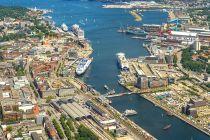
WWII aircraft bombs to be defused in Germany's Kiel shipyard park
In Kiel (Germany), an important day is approaching as authorities prepare to defuse two Second World War bombs in the Kiel shipyard park. The...
July 21, 2023 - Cruise Industry

Swedish researchers develop induction technology for wireless charging ferries
Researchers from the Chalmers University of Technology (Goteborg) developed an induction technology to wirelessly charge batteries in electric...
February 6, 2023 - Cruise Industry

World’s first methanol ferry Stena Germanica completes ship-to-ship bunkering at Port Gothenburg...
On January 23rd, the first methanol ferry in the world, Stena Germanica, was the first non-tanker to complete STS-ship-to-ship methanol bunkering at...
January 26, 2023 - Cruise Industry

Port Goteborg/Gothenburg (Sweden) welcomes 81 cruise ship calls in 2022
A total of 81 cruise ships called at the Port of Gothenburg (Goteborg, Sweden) in 2022. That is 7 calls more than the previous record season of 2014...
December 27, 2022 - Cruise Industry
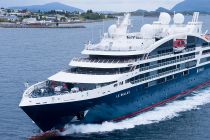
Ponant launches Northern Hemisphere Summer 2024 program
Ponant launched its Northern Hemisphere Summer 2024 program. Highlights include Northern Europe, the Mediterranean, and the Atlantic. 50 new...
December 6, 2022 - Cruise Industry
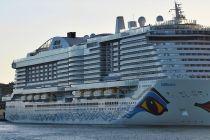
AIDA Cruises launches new itineraries (ships AIDAdiva, AIDAmar, AIDAnova) in summer 2023
For summer 2023 season, AIDA Cruises is launching new itineraries for the ships AIDAnova, AIDAmar, and AIDAdiva. A variety of northern travel...
August 4, 2022 - Cruise Industry
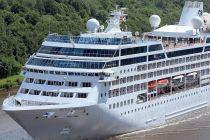
Azamara Cruises launches Europe 2023 fleet deployment
The boutique-style, ultra-luxury travel brand Azamara announced the launch of its Europe 2023 deployment across a full fleet of cruise ships for the...
August 21, 2021 - Cruise Industry
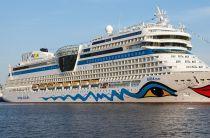
AIDA Cruises starting Hamburg homeporting season with AIDAmar ship
AIDA Cruises is starting its Hamburg Germany homeporting season with the ship AIDAmar. The liner is scheduled to depart from the port 13 times in...
July 31, 2021 - Cruise Industry

AIDA Cruises' ship AIDAluna to restart on September 5 from Kiel, Germany
AIDA Cruises announced that on Septеmber 5 its AIDAluna ship would become the 7th in the fleet to restart passenger operations this year. Up to and...
July 29, 2021 - show more news
